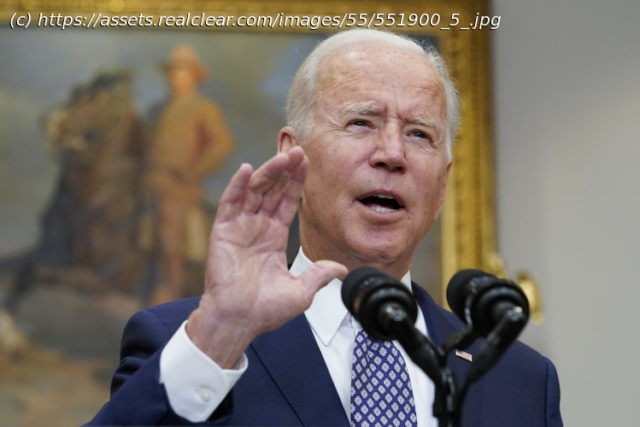A painting of Theodore Roosevelt galloping into battle was behind him. A portrait of Franklin Roosevelt was directly to his right. And on his own …
A painting of Theodore Roosevelt galloping into battle was behind him. A portrait of Franklin Roosevelt was directly to his right. And on his own face, a grim picture of determination. In remarks Tuesday, President Biden described how America has been in a crisis, her future very much in doubt, but how there is now hope for renewal at the end of a national trial. He was discussing his desire for Congress to pass his preferred budget package to “win the future” and “take the next step” in overcoming the economic challenges brought by the coronavirus pandemic. Only after five minutes of citing boilerplate details about congressional negotiations and domestic spending priorities did the president turn his attention to the chaos consuming Afghanistan. The speech, delayed by more than four hours, lasted less than 12 minutes and illustrated how this White House is clinging to Biden’s promise of a return to normal at home amid the foreign policy catastrophe playing out in real-time on cable news. And yet, the word from the commander-in-chief was that he plans to stick by his deadline for withdrawing the U.S. completely from Afghanistan. Despite pleas from allies around the world, Biden said the frantic evacuation efforts underway would end on Aug.31, a date conditional on continued cooperation from the Taliban, who have said that it is their “red line.” “The sooner we can finish, the better,” Biden said of the withdrawal, arguing that the longer the U.S. stayed on the ground, the greater the risk of a terrorist attack. “Every day we’re on the ground is another day we know that ISIS-K [Islamic State Khorasan] is seeking to target the airport, attack both U.S. and allied forces and innocent civilians.” He announced the Pentagon and State Department were drawing up contingency plans in case it took longer to get Americans out but added that he is “determined to ensure we complete our mission.” When exactly is the deadline, though, a reporter had asked the White House press secretary about an hour earlier. Was the understanding between the U.S. and the Taliban that time runs out at midnight on Aug.31 or midnight Aug.30? And was that Eastern Standard Time or Afghan time? It is a pertinent question – perhaps a life-and-death question for those in the human wave descending on the Kabul airport, desperate for a flight out of the country.






